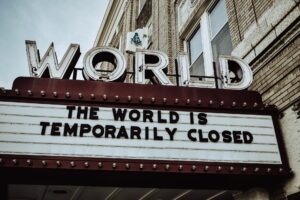“Art is subjective.”
That’s something that is always said by artists of all kinds. I think sometimes it’s used as a method to deflect or softly absorb criticism. It’s like, “If you don’t like what I do, that’s just your problem because it’s subjective!”
So, let’s look at the idea of subjectivity: Subjective is the notion that something is based on or infused by personal feelings, tastes, or opinions.
In theory, art being subjective is a coherent, rational thought process. It allows for opposing views of various topics easy appeasement when perhaps a view is presented that goes against someone else’s view.
I feel like this was the remedy for all of the killing new ideas caused way back in the day.
When you think about it, everything is art. I know that may come across as cliché, but it’s true. Outside of normal art mediums such as visual, audio, and written art, I would like to submit that even some of the sciences have an artistic flair.
I mean, “art is the expression or application of human creative skill and imagination.” (Thanks Dictionary.com!) So follow my train of thought here. From the dawn of time, humans have endeavored to understand and learn more about how things work or how to make things easier on ourselves. In ancient times, the basis of all sciences from physics to astronomy, biology to chemistry and everything in between started with philosophy.
That being said, when I consider the “great philosophers” such as Aristotle, Socrates or Plato, I think of these jobless dudes going around spouting their thoughts and theories to anyone who would listen, (and likely those who didn’t want to hear it) about everything under the sun, asking questions and postulating answers. The Socratic method is literally intended to facilitate thought and critical thinking, is that not the very nature and reason for art? When Nicolaus Copernicus came up with the theory of heliocentrism and drafted his manuscript, “De Revolutionibus erbium coelestium,” he didn’t even want to publish it because he was concerned with the amount of scorn and blowback from others. Is that not the fear of any artist? Afraid to be mocked or scorned for our ideas and thoughts?
When considering any great scientific or mathematical theory that led to what is now considered common knowledge and fact, many were discovered by people who were scorned, vilified, accused of heresy, and driven away from their homes solely for having a vision or thought that went against a common ideal. Some of these people died, not realizing the thought that maybe ruined their lives turned out to be something that changed the course of history.
I know, I know…. “But, BJ, math and science are provable and verifiable facts, art is made up!”
You know what else was made up? Gravity, Helocentrism, the Pygthagorean theorem, the Internet, even religion!!
Pump your breaks people…Full disclosure: Do I believe in God? Yes. Do I believe in science and mathematics? Yes. (Do I understand them? Usually, no.) Are these things mutually exclusive? No. My point is, everything was made up, until it was verified. Everything starts out as a theory, and then it’s proven. Every theory started as an idea. Every idea stems from creativity, the very required component for art.
For me, art is sociological theory. In a society made up of so many different kinds of people, with different types of experiences and different opportunities. Art is simply giving anyone with a voice to speak their truth. Sounds like I’m straying towards subjectivity, doesn’t it? I’m not, that’s the point of art. There is one sun, there is one Earth. There are only so many ways to make a triangle. The basic tenets of math and sciences dealt with concrete information, and even now there are thousands upon thousands of scientist and mathematicians spending years and millions of dollars utilizing these principles to find new ways to manipulate them.
Unlike the centerpieces of math and science, there are far more humans in the world. So that is the problem with nailing down one simple truth for all of humanity. There are multiple truths because there are so many different people in the world, then it is also possible that multiple truths can exist at the same time. Art is the medium of postulating those truths with the hope that others will absorb and consider those concepts. It is meant to transport the mind to try to get others to see a truth or fact that perhaps they wouldn’t see otherwise.
And like the great minds of science and mathematics, art brings a response. For those who did not understand or believe in the impossible in the field of math and science, these responses were often negative and sometimes violent. When Martin Luther King, Jr. pressed his ideals and beliefs that given the opportunity, African-Americans could thrive and be a part of modern society, he was killed because his ideas and theories fell on the ears of some who were so set in their own truths and facts that they were willing to kill. When anything challenges the status quo of thinking, it brings a response that is usually based in misguided fear. Such is the reception of art.
So I ask you: Is art subjective? Or is the problem that the human mind’s ability to critically think subjective?
Can’t it be both?
Maybe the truth lies somewhere in between. Data does not truly uncover the secrets of the human mind. Scientific testing cannot help us truly understand the best way to interact with the conundrum that is humanity. It’s listening to each other, it’s empathy, it’s trying to hear all of the truths…
It’s art…
“Art is the uniting of the subjective with the objective,
of nature with reason, of the unconscious with the conscious, and
therefore art is the highest means of knowledge.”
– Leo Tolstoy






